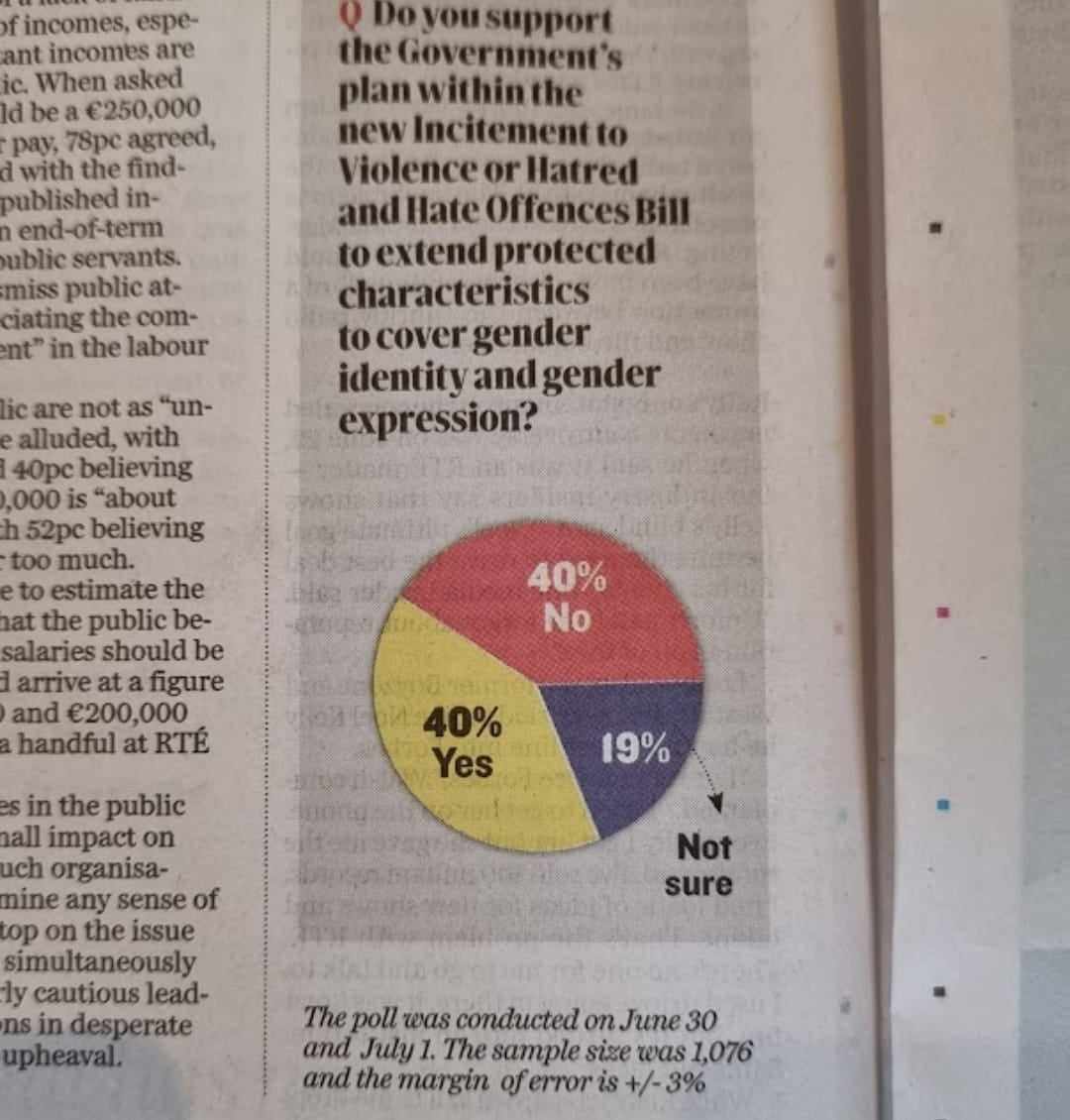The power of the internet is so all-consuming these days that when a newspaper publishes a story and does not put it online, it’s almost as if the story was never published at all. That, presumably, explains the relative lack of interest in the Sunday Independent’s very interesting poll, published on Sunday, about the proposed Hate Speech bill.
The story not being online means that I can’t link to it, so a photograph of the results will have to suffice by way of credit:

The first thing to note here is that the pollster – Dr. Kevin Cunningham of Ireland Thinks – is one of the best in the business. Almost always, when I write stories about polls, the comments are full of people convinced that the result is legitimate, if they agree with it, or that the figures have been in some way cooked if they disagree with it. But if Ireland Thinks say the figures are 40/40, then there is no reason to doubt them.
And besides: Opponents of the hate speech bill should take great comfort from those numbers.
The first thing to understand about opinion polls is that they measure support, but not intensity of support. If you are polling people and asking them how they are voting in the election, then a person who always votes Fianna Fáil and whose father’s father’s father voted Fianna Fáil counts exactly the same as somebody who doesn’t really know and says “I’m leaning Fianna Fáil for now”. One of those voters has an opinion that might change six times in a week – the other has an opinion that will never really change.
The second thing to understand is that when voters don’t know much about an issue, they will often express an opinion on it based on their priors: Thus, “do you support or oppose the Government’s inclusion of gender identity and expression within hate speech bill” may well sound, to someone with no real knowledge of the contents of such a bill, like “do you support or oppose hate speech against people’s identity and gender expression”? If you have no strong opinions, but think hate speech is broadly bad (which it is) then you might in principle be in favour of efforts to limit it, without really having given the specific proposal much thought.
And the third thing to understand about opinion polling is that by its very nature, it is slanted towards capturing the views of the politically disengaged. If online polls (like those we run on Gript, or the ones on the Journal) were any use, there’d be no need for professional polling: Every election could be predicted by just counting hardcore Sinn Fein people against hardcore Fine Gael people. The average voter, by contrast, basically doesn’t think about politics at all, and does not hear much about it. They get their news from RTE, or a quick scan of the Independent or Irish Times website. Which means, in general, that they’ll have seen much more favourable or positive-to-indifferent coverage of the Hate Speech bill than those who scour the internet for Ronan Mullen’s (admittedly excellent) TikTok clips will have seen.
In that context, the country being divided roughly equally is an astonishingly poor result for the Hate Speech Bill. It suggests higher than usual levels of public engagement with the minutiae of day to day politics, and it suggests that this particular debate has broken through the usual wall of public indifference to legislation.
Now, if I can be forgiven a quick detour from relatively factual statements into outright opinion: My hunch here is that if you were to delve deeper into the numbers, you would find that opposition to the hate speech bill is more intense, and more informed, than support for it is. When you consider all the factors mitigating against the opposition side in this debate – the fact that almost every political party is for the bill, the relatively tepid media coverage, the large NGO campaign for it – as well as the polling limitations I outline above, the case for this take becomes quite strong.
After all, it suggests that 40% of the country are at odds with the official advice of the entire political establishment, in a debate that has only really commenced in recent weeks. At the same time, for comparison, in the abortion and gay marriage debates, opposition was regularly limited to the low 20s in public opinion polls. Given the usual (not universal, but usual) trend that opposition to Government proposals increases the more they are debated, that would indicate that the hate speech bill is in a perilous political position indeed, and at risk of becoming deeply unpopular.
What’s more: The position may well get worse if the bill passes. This debate is, for now, entirely theoretical. If the pattern here follows the pattern in other countries, and mothers start getting arrested for objecting to transgender stuff in their schools, it could become a lethal problem for the political establishment.
But for now, this is where we are, according to a good pollster: 40% in favour, 40% against. That’s almost the first time in years when the non-progressive side in an Irish debate has been found to be holding its own with the public. In itself, that’s notable. And encouraging.